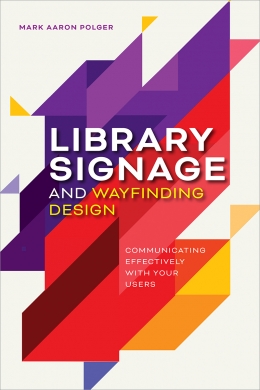Primary tabs
You don't need to be an ALA Member to purchase from the ALA Store, but you'll be asked to create an online account/profile during checkout to proceed. This Web Account is for both Members and non-Members. Note that your ALA Member discount will be applied at the final step of the checkout process.
If you are Tax-Exempt, please verify that your account is currently set up as exempt before placing your order, as our new fulfillment center will need current documentation. Learn how to verify here.
- Description
- Table of Contents
- About the author
- Reviews
This book connects wayfinding and signage with user experience (UX) design principles to assist libraries in creating positive, welcoming signage that communicates effectively and efficiently.
Take a more user-centered approach to crafting library signage with this handy guide. Well-designed signage is clear, direct, and reduces confusion and frustration among library users and library workers alike—and also complies with the Americans with Disabilities Act (ADA), bolstering accessibility. Using the principles and examples laid out by Polger, you’ll learn
- how to spot the telltale features of poor design, from signage that’s wordy, passive aggressive, too small, unfriendly or threatening, to wayfinding that uses inconsistent terminology or different color schemes or typefaces;
- why taking a UX (user experience) approach can help make the library a welcoming space;
- core UX criteria for effective wayfinding design, such as the specific design zones of a sign, appropriate typefaces, color schemata, text to image ratio, text and image sizes, contrast, and viewing distance;
- about important considerations like placement and touchpoints;
- best practices for using ADA compliance guidelines when performing a library signage audit;
- special approaches for digital signage; and
- techniques that signage designers can use when studying library users to better understand their perceptions, feelings, and attitudes regarding signage and wayfinding.
Preface: My Fascination with Street Signs
Acknowledgments
Introduction: Why Is Signage Important?
Chapter 1 A Brief History of Signs and Wayfinding
Chapter 2 Signage Research Methods
Chapter 3 Conducting a Signage Audit
Chapter 4 Digital Signage
Chapter 5 Signage Best Practices and Policies
Chapter 6 Signage and the Americans with Disabilities Act
Conclusion
Index
Mark Aaron Polger
Mark Aaron Polger (they/them) is an academic librarian and information literacy instructor who has been working in libraries since 1992. They received their MLIS degree in 2000 from the University of Western Ontario (London, Ontario, Canada) and has worked as a librarian in public, hospital, and academic libraries. Currently, they are the Coordinator of Library Outreach at the College of Staten Island, City University of New York (CUNY).
"Libraries, so often large buildings with unintuitive layouts, can intimidate users, and signage is frequently an afterthought when it should be a focus. With thoughtful attention to signage, librarians can increase both users’ comfort with the library and their ability to navigate the building successfully. For any librarian without a design background, Mark Aaron Polger provides all the information needed to improve library signage in his well-researched and practical book ... It provides librarians from all types of libraries with the knowledge they need to improve upon their library’s existing signage. Additionally, this book has something for everyone, regardless of how much time and staffing they can dedicate to signage improvements."
— Journal of Access Services
"Anyone who has attempted to navigate an unfamiliar building with inadequate or nonexistent signage understands how frustrating that can be ... Polger offers clear, practical, actionable advice for improving how libraries communicate with users through signage. Will appeal broadly to library workers in public service-related positions."
— Library Journal
"Written by Mark Aaron Polger, who confesses upfront to be ‘obsessed with street signs and maps’ since childhood, the genuine passion shows. Systematically, Mark leads us through the world of library signs in six concise chapters ... We liked the fact that this book was very well researched. It included ample, useful bibliographies and made use of numerous illustrations, charts and graphs that added to its easy use nature."
— Journal of the Australian Library and Information Association
"The case studies show that there is not one way to do this work, and that’s a point made throughout: to get signage right, you need to take a user-centered approach and develop a system that works for your specific library and context ... Good luck to all the library staff out there in charge of signage and wayfinding! Use Polger’s book for principles and ideas and to reassure yourself when you wonder why it’s so challenging."
— Weave: Journal of Library User Experience



